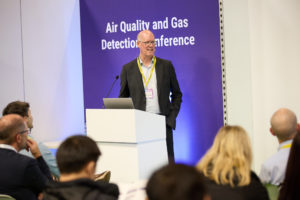

 Air quality is a critical issue, hitting deprived communities the hardest. These areas often find themselves near industrial zones and busy roads, lacking the green infrastructure that could naturally clean the air. This unfortunate reality places a disproportionate health burden on residents already facing socioeconomic challenges.
Air quality is a critical issue, hitting deprived communities the hardest. These areas often find themselves near industrial zones and busy roads, lacking the green infrastructure that could naturally clean the air. This unfortunate reality places a disproportionate health burden on residents already facing socioeconomic challenges.
The health consequences are severe and far-reaching. Respiratory and cardiovascular diseases are rampant, with air pollution worsening conditions like asthma, bronchitis, and COPD. Fine particulate matter (PM2.5) and other toxic gases such as Nitrogen Dioxide and Ozone can trigger heart attacks and strokes, leaving these communities highly vulnerable. Children and the elderly are particularly susceptible, experiencing higher rates of respiratory infections and reduced lung function.
Beyond immediate physical ailments, air pollution has insidious neurological and developmental impacts. Research links long-term exposure to cognitive decline and an increased risk of dementia in older adults. For children, it can impair cognitive development and academic performance. Pregnant women in polluted areas face higher risks of adverse birth outcomes like low birth weight and preterm births, with potential lifelong health implications for the child. Additionally, certain pollutants are carcinogenic, contributing to lung cancer, and have been linked to diabetes, weakened immune systems, and reproductive problems.
Effectively combating this invisible threat demands a multi-pronged approach, beginning with better monitoring and data collection. Official monitoring stations provide valuable regional data but often miss the hyper-local pollution hotspots prevalent in deprived communities. This is where low-cost sensors can prove invaluable. These affordable, easily deployable devices offer granular, real-time data at a neighbourhood level, empowering communities to understand and advocate for cleaner air. Complementing these ground-level efforts are satellite monitoring and sophisticated atmospheric models, which provide a broader perspective, identifying large-scale pollution patterns and even predicting future trends. This comprehensive data picture highlights areas most in need of intervention.
Addressing the issue also requires robust policy and infrastructure changes. Urban planning must be re-evaluated to prevent the placement of polluting industries near residential areas, especially in vulnerable communities. Investing in green infrastructure, such as parks and tree-lined streets, acts as natural air filters. Expanding and improving public transportation networks reduces reliance on private vehicles, cutting emissions. Crucially, stricter emission standards for industries and vehicles are essential to reduce the overall pollutant load.
Technological advancements also offer promising solutions. The transition to electric vehicles, supported by widespread charging infrastructure, is vital. Industries must be incentivised and regulated to adopt advanced pollution control technologies. Smart city solutions, like intelligent traffic management systems, can optimise traffic flow and reduce idling emissions. At a household level, providing access to air purifiers and optimal ventilation can offer immediate, though often temporary, relief from indoor air pollution.
Behavioural changes and community engagement are equally important. Educating the public about air pollution risks and promoting sustainable living practices, like walking, cycling, and public transport fosters environmental responsibility. Empowering communities to participate in air quality monitoring and decision making ensures solutions are tailored to their specific needs. Healthcare providers also play a crucial role in advising patients on minimising exposure and managing pollution-related health conditions.
The ESS Expo featuring AQE (Air Quality & Emissions), taking place in Birmingham, UK, on September 17th and 18th, 2025, offers a significant opportunity to explore many of these solutions. This leading exhibition and conference for environmental services and strategies brings together experts from various sectors. Attendees can expect to see innovations in air quality monitoring technology, learn about sustainable urban development best practices, and discover new approaches to waste management – all contributing to better air quality. The expo will feature exhibitors showcasing solutions for reducing industrial emissions, improving vehicle efficiency, and developing green infrastructure. Conference sessions will cover environmental policy, public health implications of pollution, and community engagement strategies. For those interested in environmental management and its impact on public health, especially in vulnerable communities, the ESS Expo in Birmingham will be a valuable platform for networking, learning, and collaborating on actionable solutions. Registration is free.
"Ultimately, clean air is a fundamental human right, not a luxury. Its provision must be equitable, ensuring no community is disproportionately burdened by pollution. Addressing this moral imperative will lead to healthier individuals and more resilient communities for generations to come".
Jim Mills, Managing Director, Scotswolds, and Air & Emissions Ambassador at ESS Expo 2025
Jim is Managing Director of Scotswolds and a long-standing specialist in air quality monitoring and environmental instrumentation. Originally trained as an industrial chemist and chemical engineer in Paisley, Scotland, he began his career in optical spectroscopy before founding ETI Ltd. in 1992, which grew to become the UK’s largest air quality monitoring company. This was later sold as part of EMC Group Ltd. in 2001. He went on to co-found Air Monitors Ltd. in 2002, establishing it as a UK and European leader in monitoring technologies before selling to ACOEM Group in 2019.
Now leading Scotswolds, Jim focuses on the design, deployment and quality assurance of sensor networks to improve access to air quality information. He is a founder member and director of the Environmental Industries Association (EIA Ltd), chairs its Air Quality working group, and acts as its Scottish lead. He also sits on the air quality working group of Environmental Protection Scotland (EPS), supporting efforts toward a cleaner and healthier environment. For the past several years, he has chaired the scientific committee of the UK’s largest air quality and emissions conference and exhibition, AQE, helping to shape the national agenda on air pollution.
Jim Mills is a Founding Member, Director and Air Quality Chair of the Environmental Industries Association. Jim is acting as the Air & Emissions Ambassador at ESS Expo 2025, taking place from 17-18th September 2025 at the Birmingham NEC.
Visit our stand at AQE - P100.



 The collapse of the UN Global Plastics Treaty negotiations in Geneva marks a critical failure in the global fight against plastic pollution. As Co-Chair of the Environmental Industries Association (EIA) Climate Change Group, I am deeply concerned by the lack of progress and the implications this has for the UK’s environmental leadership and industrial innovation. In my previous role as Environment Minister I was on the front line of negotiations back in 2024 and the UK was a key player in a group of over 80 countries pushing for high ambition for this treaty which included setting targets to cap production with the ultimate aim of reducing harm form plastic pollution by 2040 . However, despite extra time being given for the negotiations, a year on, the talks are in tatters and the consequences are serious.
The collapse of the UN Global Plastics Treaty negotiations in Geneva marks a critical failure in the global fight against plastic pollution. As Co-Chair of the Environmental Industries Association (EIA) Climate Change Group, I am deeply concerned by the lack of progress and the implications this has for the UK’s environmental leadership and industrial innovation. In my previous role as Environment Minister I was on the front line of negotiations back in 2024 and the UK was a key player in a group of over 80 countries pushing for high ambition for this treaty which included setting targets to cap production with the ultimate aim of reducing harm form plastic pollution by 2040 . However, despite extra time being given for the negotiations, a year on, the talks are in tatters and the consequences are serious.

 Westminster – May 13, 2025 – A leading delegation from the Environmental Industries Association (EIA) attended the House of Lords this morning to meeting with the Earl of Lindsay, Chairman of the United Kingdom Accreditation Service (UKAS), to discuss the opportunities and challenges facing the UK Environmental Laboratory Sector. This meeting brought together a delegation of EIA Environmental Laboratories to showcase their exceptional work in various fields, including soil and water analysis, PFAS analysis, microplastics investigation, asbestos testing, hydrocarbons, coal tar, and food hygiene.
Westminster – May 13, 2025 – A leading delegation from the Environmental Industries Association (EIA) attended the House of Lords this morning to meeting with the Earl of Lindsay, Chairman of the United Kingdom Accreditation Service (UKAS), to discuss the opportunities and challenges facing the UK Environmental Laboratory Sector. This meeting brought together a delegation of EIA Environmental Laboratories to showcase their exceptional work in various fields, including soil and water analysis, PFAS analysis, microplastics investigation, asbestos testing, hydrocarbons, coal tar, and food hygiene.




 The Environmental Industries Association (EIA) has welcomed the recent announcement by the Chancellor, Rachel Reeves (Oxford, January 29, 2025) on economic growth and the delivery of critical infrastructure. Michael Lunn, CEO of the EIA, expressed both optimism and a word of warning regarding the proposed measures.
The Environmental Industries Association (EIA) has welcomed the recent announcement by the Chancellor, Rachel Reeves (Oxford, January 29, 2025) on economic growth and the delivery of critical infrastructure. Michael Lunn, CEO of the EIA, expressed both optimism and a word of warning regarding the proposed measures.
 London, 13 December 2024 – Environmental Industries Association Highlights Impacts of Revised NPPF and Brownfield First Strategy
London, 13 December 2024 – Environmental Industries Association Highlights Impacts of Revised NPPF and Brownfield First Strategy
